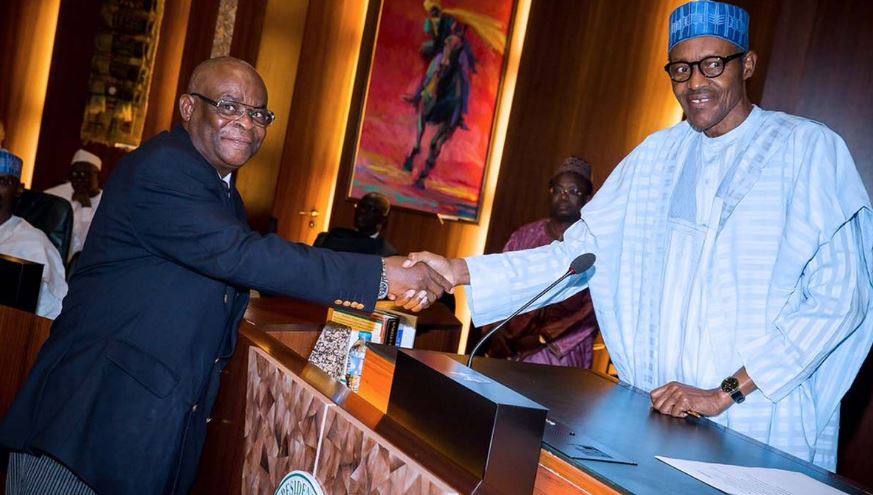
Guardian / Nigeria: About one and a half months after Justice Walter Onnoghen was sworn in as the acting Chief Justice of Nigeria (CJN), hopes that his appointment would be confirmed are getting dimmer.
Onnoghen was appointed the acting CJN by President Muhammadu Buhari on November 11, 2016 following the retirement of the immediate past CJN, Mohammed Mahmud on November 10.
This is the first time the holder of the office would be appointed in acting capacity for such a length of time in recent times. He now has till February 10, 2017 to get his appointment validated by the National Assembly or be removed from office.
Section 321 (5) of the 1999 Constitution as amended stipulates that any person so appointed “shall cease to have effect after the expiration of three months from the date of such appointment, and the President shall not re-appoint a person whose appointment has lapsed”, meaning that Justice Onnoghen, if not confirmed, would leave the office.
Stakeholders are deeply concerned that the uncertainty over whether Onnoghen would be the substantive CJN or not, might impede justice administration and judicial reforms in the country.
This development also confirms worries from different quarters that there are grand plots to deny justices from the Southern part of Nigeria the opportunity of heading the apex court. The next in rank to Justice Onnoghen is a Northerner, Justice Ibrahim Tanko Muhammad from Bauchi State.
The last time a Southerner headed the apex court was in 1985, when Justice Ayo Gabriel Irikefe held sway. Since then, the North has produced virtually all the CJNs. Justice Mohammed Bello took over from Irikefe from 1987 to1995. Justice Muhammadu Lawal Uwais served between 1995 and 2006; Justice Salisu Modibo Alfa Belgore (2006-2007), Justice Idris Legbo Kutigi (2007-2009), Justice Aloysius Iyorgyer Katsina-Alu (2009-2011), Justice Aloma Mariam Mukhtar (2012-2014) and Justice Mahmud Mohammed who began to serve from 2014 till November 10, 2016.
Underscoring the seriousness of the issue, a Lagos lawyer, Chief Malcolm Omirhobo has filed a suit at the Federal High Court, Abuja asking the court to compel President Muhammadu Buhari to forward Onnoghen’s name to the National Assembly for confirmation.
Respondents in the suit are Buhari, attorney general of the federation, federal judicial service commission, Justice Onnoghen and the National Judicial Council (NJC).
Among other prayers, the plaintiff wants the court to declare that by Section 231(3) of the 1999 Constitution, the first respondent as the head of the executive arm of government cannot handpick and/or choose who he wants to be the head of the judicial arm of government.
A retired Justice of the Supreme Court, Olufunlola Oyelola Adekeye, is unhappy with the development. According to her, the appointment of Onnoghen in acting capacity may affect reforms in the judicial sector.
Speaking to The Guardian, Justice Adekeye, who retired from the Supreme Court in October 2012, having attained the mandatory retirement age of 70 years, maintained it would be difficult for a CJN in acting capacity to introduce reforms in the judicial sector since he is not sure of his time frame in office.
She said: “When you have an acting CJN, who can be removed at any time, he will lay down whatever he wants to do as a substantive CJN but will wait until he is appointed properly.
“It is very important. When you have a solid tenure of office and you know what to do, you can swing into action.”When your tenure is not certain, you do not know what to do. That surely will affect the Nigerian judiciary; not only in the dispensation of justice but in several other ways.
“When you are the CJN, you are the head of judiciary, you must definitely have your own pattern or whatever style you want to introduce to the system to benefit it.
“But no reform can be done now when you do not know your position. This is the first time we are having an acting CJN. It has never happened in Nigeria. May God help us in Nigeria.”
Justice Adeyeke further charged government to always adhere to constitutional provisions in its decisions and actions.”The Constitution must be strictly followed. There is a provision in the Constitution for the appointment of the CJN. It says the next in rank.”So, we do not know whatever reason the government may have to appoint Justice Onnoghen in acting capacity,” she said.


